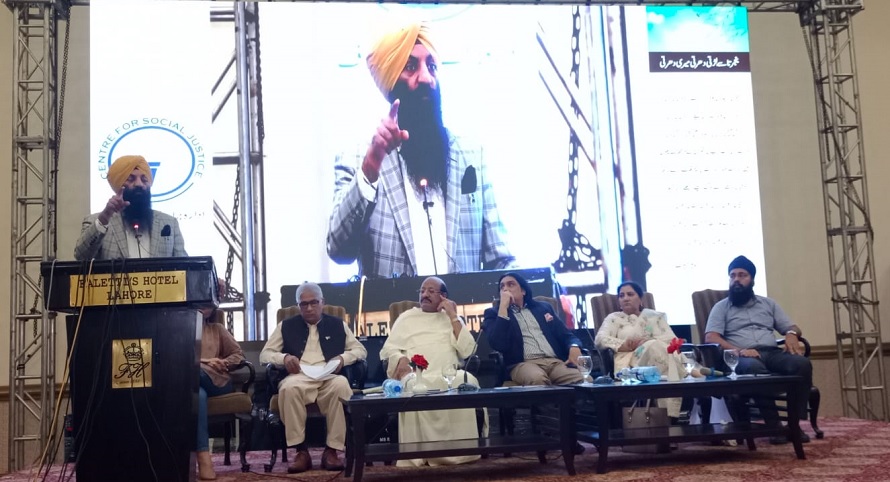LAHORE, Pakistan: The Convention on “How to Tackle extremism in Pakistan” organized by the Centre for Social Justice (CSJ) in Lahore to mark National Minorities Day emphasized the critical issue of extremism, its manifestation, and government’s role in addressing this issue for the promotion of religious freedom and tolerance, equality of rights, and non-discrimination for all, as a national aspiration.
The participants of the Convention recalled the vision of Quaid-e-Azam towards building a progressive and tolerant nation, presented in his inaugural address to the Constituent Assembly of Pakistan on August 11, 1947.
They acknowledged that the government introduced the National Action Plan 2014 to counter terrorism which includes measures to combat religious and sectarian persecution and curb hate speech, militancy, and intolerance. They also acknowledged the pledges made by the political parties in their electoral manifestos to prevent intolerance and extremism, and safeguard minorities’ rights.
The participants welcomed the resolutions passed in the Senate, Punjab Assembly, and National Assembly which condemned the mob lynching incidents following blasphemy accusations that occurred in Sargodha and Swat and sought action by the government to protect all citizens, and prosecute those persons involved in these heinous crimes.
Realizing that the hate speech witnessed in public speeches and social media promotes intolerance and violence targeting religious or belief communities in Pakistan, they maintained that the repeated incidents of violence against minorities such as attacks on places of worship, minority settlements, and target killings have occurred with impunity enjoyed by perpetrators.
Admitting that religious minorities face discrimination and violence, and challenges to access effective remedies, they emphasized the need for creating favorable conditions for minorities to express their concerns and engage in policy matters, and identify solutions to prevent and address human rights issues that they confront.
Also admitting that Jinnah’s vision for equality of rights for all citizens without any distinction has been ignored by successive governments, they unanimously reiterated that speech is used as a compass for the formulation of laws and policies.
“We emphasize the need for effective participation and integration of minorities in the national mainstream in all tiers of governance and decision-making, and the incorporation of minorities’ input to strengthen affirmative measures to enhance citizens’ access to justice, and enjoyment of human rights and fundamental freedoms,” they noted.
The participants called the attention of all stakeholders to the human rights challenges such as religious intolerance, extremism, and discrimination.
They resolved to work with all stakeholders, and called upon the federal and provincial governments to take the following measures:
- Amend blasphemy laws and introduce legal and administrative safeguards to prevent false accusations.
- Enact and implement the law to criminalize forced faith conversion of minority girls and women.
- Encourage a balance between freedom of expression and preventing hate speech, ensuring that laws do not stifle open debate but are used to curb incitement of violence.
- Introduce educational reforms after consultation with civil society, and ensure that the policy measures in pursuance of improving curricula, textbooks, and examination system contribute to developing inclusive and equitable quality education, and they do not violate the constitutional protection of religious freedom and non-discrimination under Articles 20, 22 (1), and 25 of the Constitution of Pakistan.
- Constitute an independent, autonomous and empowered National Commission for Minorities Rights through an act of the Parliament with a clear mandate in accordance with the directives of the Supreme Court in order to deliver substantial progress regarding the implementation of minorities’ rights.
- Enact legislation, explicitly prohibiting discrimination, upholding religious freedom for all, and adopting a zero-tolerance policy towards hate speech, and taking action against t discrimination and violence against minorities.
- Ensure transparency and encourage regulatory bodies tasked with addressing hate speech to publish statistics on the number of complaints received regarding hate speech of minorities along with the number of cases acted upon.
- Build the capacity of law enforcement agencies and the judiciary to ensure a better understanding of hatred, discrimination, intolerance, and violence that undermine religious freedom and expression.
